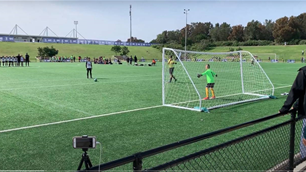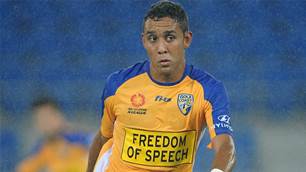I for one welcome our new Indonesian owner-lords.
Back in 2002, when I was a university student with sadly stereotypical shoulder length hair, I wagged a month’s worth of lectures at the union bar watching the World Cup Finals with an assortment of foreign students.
Since the Socceroos had not qualified for that year’s tournament I instead clung to the one half of my dual citizenship that had. My new found friends meanwhile cheered for their respective homelands.
This comingling of accents meant the world felt rather small at the time – no larger than the size of a football, in fact.
And while I don’t remember many specifics of those beer-drenched afternoons, I do recall a snippet of something poignant one of the Brazilian lads said about our big, brown land.
He mused, “Australians like to own things. They want to own the stars – the Southern Cross. I don’t think they understand it shines just as bright over my country too. Sometimes you have to share.”
To this day I believe he had a point. The Australian national psyche does somewhat obsess over ownership – after all, the ‘Australian dream’ is owning one’s own home; the oft-decried antithesis is known as ‘selling the farm; and our brand of English seems unwilling to offer any middle ground on the matter.
Now, perhaps this obsession is unavoidable for a nation founded on colonial acquisition; or perhaps it’s a reflection of a country built by immigrants who, regardless of whether they were first fleet, ten pound poms or refugees, often started with next-to-nothing.
Either way, it’s inevitable that such possessive attitudes seep into every cultural crack – including our fledgling professional football league.
And so it was that last week, with the announcement that the Indonesian based Bakrie Group took a 70% stake in Brisbane Roar FC, that some media commentators chose not to focus upon the benefits such obscenely wealthy benefactors might have on the game but rather the dangers and pitfalls of foreign investment in the A-League.
That the supposed dangers didn’t make sense didn’t really seem to matter much.
In fact, while I watched SBS’s The World Game on Monday night, I thought I had accidentally stumbled across Today Tonight or A Current Affair such was the unabashed xenophobic reaction to what, in my opinion, is a positive development for the club and the league.
The argument of the panellists was led by Craig Foster, “I said we had to help our regional friends but I didn’t mean by giving them the champion club. If Indonesians, or anyone, wants to invest in the A-League, then 49% should be the maximum amount allowable in my view. If you lose ownership, you lose control.”
I had to laugh.
Firstly, I laughed at the incredible irony that a programme aired on the nation’s multicultural broadcaster, whose very title denotes the international nature of the sport, was so incredibly against foreign ownership of an A-League club.
The irony becoming ever thicker as I recalled that the talking heads on this particular programme were the most ardent supporters of Australia’s move to the Asian Confederation in the first place.
Did they not realise our relationship with Asian football would ultimately be one that comprised both give and take?
Secondly, I laughed at this idea of control which Foster later explained, “We are a league that has to ensure that within our football system – the national teams, the grassroots and the A-League – they must all work perfectly in concert.”
The idea that clubs should work in harmony with the national set-up is preposterous if it means a club is expected to act against its own best interests.
The truth is Brisbane Roar could not continue to suckle at the FFA teat indefinitely. The club needed significant investment to secure its long term future. Investment that it has now finally found.
Personally, I couldn’t care if that cash comes from Australia, Asia or Andromeda - just so long as the cheques don’t bounce.
Ultimately the Bakrie Group’s investment will buy them no more influence at Roar than Clive Palmer has at Gold Coast United or Nathan Tinkler at the Jets. They are bound by exactly the same restrictions and responsibilities as any other A-League license holder.
Under such circumstance, it makes no sense that foreign investment should be viewed any differently to that of the born-and-bred billionaires.
If foreign investors are willing to put that amount of faith in one of our clubs, and by default our league, then I believe the least we can do is return the favour by putting some of our faith in them.
Especially when in this case, the Bakrie Group have gone to great lengths to reassure the fans of their intentions.
New Roar Chairman Dali Tahir has clearly stated that the football side of the club, such as player recruitment, will remain the responsibility of manager Ange Postecoglou and the rest of the football department.
That hopefully puts paid to rumours that a minimum number of Indonesian players will fill the club’s roster in future. Although the possibility of utilising the new owners connections through the archipelago and in Europe and South America might unearth the club a few undiscovered gems.
The new owners have also set high goals. Aga Bakrie said, “We hope this club can raise a level and become the best club in Australia and top dog in Asia.”
That sounds good to me. After all, there would be no better way to usurp Melbourne Victory and Sydney FC’s tiresome claims as the A-League’s premier club than beating them to a continental championship.
Additionally, Chairman Tahir also hinted at some exciting future possibilities, “I think that if we could have our own stadium in ten years time that would be fantastic.”
To me, that sounds awful lot like the ‘Australian dream’ and nothing like the nightmare the doubters appear to be suggesting.
So tonight, I won’t lay awake worrying that my club is now foreign owned. I will instead sleep soundly below a radiant Southern Cross that I'll happily share with the owners of Brisbane Roar FC, a Brazilian bloke whose name I have forgotten and anyone else that inhabits the same hemisphere as me.
Related Articles

Fresh talent flock to ambitious A-League outfit's pro pathway

Why A-League 20/21 is crucial for Olyroos’ medal hopes













